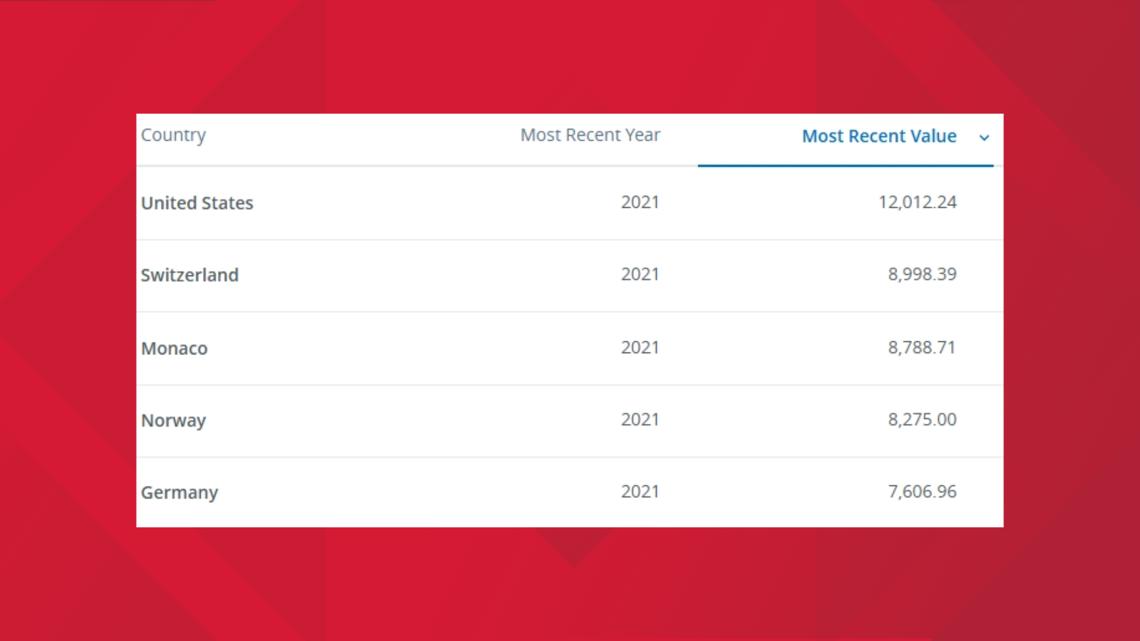In the days following the killing of UnitedHealthcare CEO Brian Thompson, people online have discussed the state of American health care, particularly its high costs.
In a handwritten document expressing his views, the suspected shooter, 26-year-old Luigi Mangione, claimed that the U.S. has the most expensive health care system in the world, but ranks number 42 in life expectancy, multiple media outlets reported.
Some on social media repeated the claim or made posts comparing the high costs of the U.S. healthcare system to the nation’s lower life expectancy.
THE QUESTION
Does the U.S. have the most expensive health care system in the world?
THE SOURCES
THE ANSWER
Yes, the U.S. has the most expensive health care system in the world.
WHAT WE FOUND
A country’s health care costs are typically measured by adding up all health care spending for people, governments, organizations and businesses, and dividing that by the total number of people in the country.
The figure includes spending on personal health care, such as drugs and hospital visits, as well as collective care, such as public health services and health administration.
The U.S. health care system is more expensive per person than any other country’s health care system, both in raw dollar amounts and when spending is adjusted to account for the cost of living in each country. This finding is consistent across data from multiple international organizations.
In 2021, the most recent year for which the World Health Organization (WHO) Global Health Expenditure database published numbers for all countries, the U.S. spent just over $12,000 on health care per person. The only other country that spent more than $10,000 was Switzerland, which spent nearly $10,900 per person.
However, when adjusted for the cost of goods in each country, the spending gap is even larger. Switzerland, which still spent the second most, spent about $9,000 on health care per person in 2021. The U.S., on the other hand, spent about $12,000 per person.


Looking at another dataset, in 2022, the U.S. spent nearly $12,600 on health care per person, according to the Organisation for Economic Co-operation and Development (OECD), an international organization made up of about 40 wealthy member countries.
The OECD collects data on its member countries. The OECD country that spent the next most on health care per person, when adjusted for the cost of goods in that country, was still Switzerland. It spent just over $8,000 per person, according to the OECD’s data.
Wealthy countries do tend to spend more money on health care per person than lower income countries, according to the Peterson-KFF Health System Tracker, a partnership between two public health non-profit organizations.
But Denmark, Switzerland, Ireland, Luxembourg and Norway are all wealthier per person than the U.S. is and spend significantly less on health care per person, according to the Health System Tracker. Ireland spends less than half of what the U.S. does on health care per person.
Life expectancy and health outcomes
When it comes to how the U.S. ranks for life expectancy and health outcomes, it’s true that the U.S. is behind dozens of other countries, although several international organizations don’t place the U.S. exactly at number 42.
A CIA World Factbook estimate for 2024 ranked the U.S. 35th in life expectancy once territories are excluded.
The WHO ranked the U.S. 45th in the world, excluding territories, in life expectancy in 2021, the most recent year for which the WHO has data for all countries.
WHO data from 2019 shows that the U.S. was 40th in life expectancy prior to the pandemic.
The U.S. experienced a bigger drop in life expectancy than other similarly wealthy countries during the COVID-19 pandemic, according to the Health System Tracker, which is run by the nonprofits The Peterson Center on Healthcare and KFF. The Health System Tracker explains this is because the pandemic increased mortality and premature death rates in the U.S. by more than it did in most peer countries, making the U.S. fall further behind in life expectancy.



